Orpheus, 1949, written and directed by Jean Cocteau.
If I were an American Idol contestant, I'd want to immediately follow Sanjaya's performance whenever I could. Orpheus has a similarly lucky slot in the Criterion Collection. After The Blood of a Poet, any film seems coherent and easy to follow. The disadvantage is less obvious: it's difficult to think of Orpheus without comparing it to The Blood of a Poet. Of course those comparisons are favorable. But listing the ways a movie is better than The Blood of a Poet is kind of a limited metric. The fact is, Orpheus can and should stand on its own; it's a wonderful, enthralling, marvelous movie. I liked it better than Beauty and the Beast.
Cocteau opens the movie with a 270° track and pan through a crowded café, ending on a profile shot of Jean Marais, who plays Orpheus.
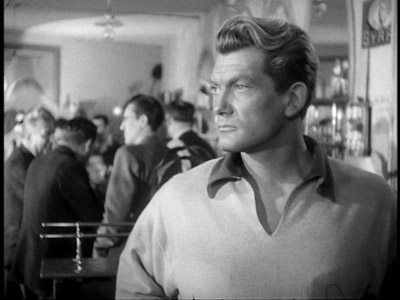
The shot is messy and overcrowded with life (and the din of conversation on the soundtrack mirrors it). This is worlds away from the stark sets and basically static camera from The Blood of a Poet. Of course, film technique had advanced between 1930 and 1949, but that doesn't account for the vast difference in affect between the two films. In Orpheus, Cocteau is interested in his characters as characters, not just cogs in an poorly working allegorical contraption.
This time around, Orpheus is a poet who has achieved popular success and paid for it with critical scorn. He resents this; we see him for the first time being snubbed at the Café des Poetes. "The public loves me," he complains to an older colleague. "The public is alone," is the reply. I never thought of Cocteau as pithy, but this film proved me wrong. And I didn't think of him as particularly kinetic either, but the opening scene ends with a knock-down-drag-out brawl set to boogie-woogie piano. Imagine fitting that in somewhere among the formalist curiosities of The Blood of a Poet.
It's an Orphic myth, so of course death has a part. Or rather, Death, played by María Casares.
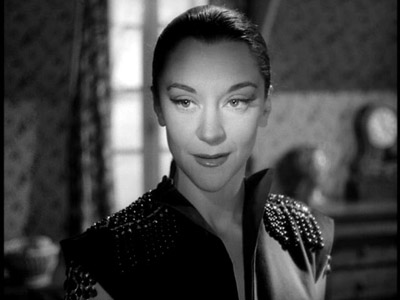
She's as perverse as she looks and maybe more so: she (or rather, her chauffeur) drives a black Rolls Royce flanked by motorcyclists in dark goggles and corsets.
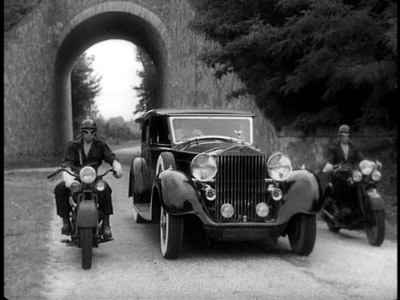
In the Orphic myth, Eurydice is killed by misfortune, and the focus of the story is his journey into the underworld. In Orpheus, the animating love story is between Orpheus and Death; Eurydice's more of an afterthought. Before going to the underworld to seek Eurydice, Orpheus is asked, "Is it Death you wish to find, or Eurydice?" He answers, "Both." So it's not exactly the story of true love thwarted that one finds in other versions.
Orpheus's search for Death and/or Eurydice isn't even the first time he sees the underworld. The brawl at the café ends with a fatality, and Orpheus is hustled into the Rolls along with the corpse ("Make yourself useful. I need you as a witness") and taken to the underworld in style. It turns out that Death has done this deliberately, apparently to get to know him better. I guess he finds this flattering, because on his return, he decides that it would be a grand idea to have Death's chauffeur stay at his house:
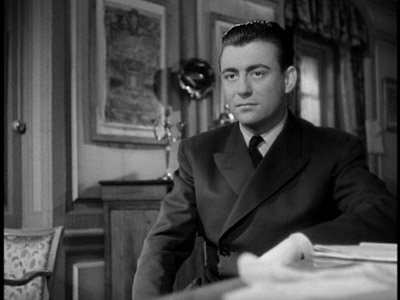
That's François Périer as the chauffeur, a recent suicide named Heurtebise. And things get stranger from there.
Unlike The Blood of a Poet, Orpheus has a narrative that makes sense (and is all set up very well in the opening scene), but it's far from structurally perfect. For one thing, there's a sequence where Eurydice has returned from the underworld, but Orpheus is forbidden to look at her. In the myth, this was only supposed to last until the lovers made their way back to the world, but in this film it's a permanent condition. For some reason, Cocteau plays this like a sitcom, with Eurydice hiding under tables and Orpheus carefully avoiding mirrors. When he finally slips up (because of the car's rear-view mirror), Heurtebise remarks, "That was bound to happen." I can understand playing the gods' arbitrary prohibition for laughs, I guess, but the tone doesn't match the melancholy of much of the rest of the film.
Orpheus's beauty isn't in its structure, however, but in its perfect details. My favorite was the underworld's talk radio. The radio in Death's car picks up a station unavailable elsewhere, on which a voice reads near-random phrases like "Silence goes faster backwards." Orpheus becomes obsessed with the station, spending a lot of time out in the garage with a notepad.
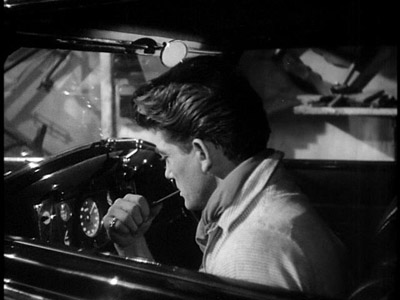
As with the mouth on the artist's hand in The Blood of a Poet, that's a rich enough idea to be the basis for an entire film, but it's just a small piece of this movie. Cocteau even makes the effects that are reused from The Blood of a Poet seem fresh. Remember the scene in The Blood of a Poet where the Poet splashes through the mirror? Orpheus makes a similar journey, but this time Cocteau uses mercury instead of water:
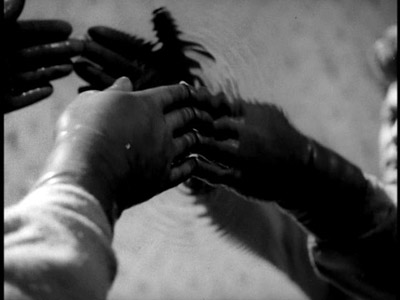
It slowly ripples away from Orpheus's hands, and with the addition of a nice sound cue, the effect is haunting. The tracking shot from Beauty and the Beast where Josette Day is pulled along on a dolly makes a reappearance, as do painted eyelids, reversed film, and horizontal sets. But everything works better here than in the earlier films, and has its own internal logic. One example. In The Blood of a Poet, the Poet goes through the mirror because the living statue of Lee Miller suggests it, and he can't find any other way out of his room. I'm sure there was an intricate symbolic meaning to the mirror there that I missed, but it wasn't exactly obvious. Orpheus goes through the mirror because, as Heurtebise explains:
Mirrors are the doors through which death comes and goes. Look at yourself in a mirror all your life, and you'll see death at work, like bees in a hive of glass.
It's hard to top that.
Randoms:
- Death's car radio resonated with me because I had a mild obsession with numbers stations as a kid. It turns out Cocteau was inspired by BBC broadcasts to the French Resistance during World War II, so the resemblance is quite deliberate.
- The bureaucrats who run the underworld also seem to owe more than a little to occupied France.
- The writing, on a line-by-line basis, is often excellent (if a little overwrought). Another nice line from Orpheus, on seeing that he is about to be killed by the Bacchae:
What does marble think when it's being sculpted? It thinks, "I am struck, insulted, ruined, lost." Life is sculpting me. Let it finish its work.
Orpheus's awareness that his life is taking on form would not be out of place in Nabokov.
- I didn't love Georges Auric's scores for The Blood of a Poet or Beauty and the Beast1, so it's worth noting that his score for this is beautiful, particularly the theme used when Orpheus and Heurtebise travel to the underworld after Eurydice's death.
- François Périer's performance deserves special mention for its melancholy wit. On being told that Orpheus is looking for both Death and Eurydice in the underworld, he replies, "I am delighted that I am no longer alive."
- The craziest piece of trivia from Jean Cocteau's exceptionally crazy life: in the twenties, he managed the boxing career of Panama Al Brown, boxing's first Hispanic champion. Panama Al also may have been boxing's first gay champion, since he was reputedly Cocteau's lover2. Their tumultuous relationship was adopted for film in 1982's Rocky III.
- The craziest piece of trivia from Panama Al Brown's exceptionally crazy life: he won a fight in fifteen seconds (including the referee's count) when he broke his opponent's jaw with his first punch.
- Cocteau apparently wanted Marlene Dietrich or Greta Garbo in the role of Death. Roger Ebert seems to think her absence is the film's greatest flaw, but really, how fair a criticism is this? What movie would not be better with Marlene Dietrich or Greta Garbo? I can think of only one.
2I mean he may have been first, not he may have been gay.

